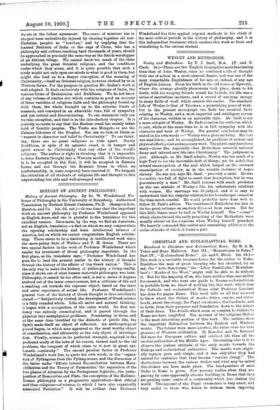WESLEY AND METHODISM.
Wesley and Methodism. By F. J. Snell, M.A. (T. and T. Clark. Ss.)—There are few English biographies more fascinating than that of John Wesley, since he combined a life of thought with one of action in a most unusual degree, and was one of the meat remarkable Englishmen of his age, or, indeed, of any age of English history. From his birth in the old house at Epworth, where the strange ghostly phenomena took place, down to his death, with his weeping friends round his bedside, his life was a series of marvellous incidents, and a record of untiring energy in many fields of work which amazes the reader. The standard Life of Wesley is that of Tyerman, a painstaking piece of work, but in the present monograph one finds the essential facts relating to Wesley, and a most impartial and intelligent survey of his character, written in an agreeable style. Mr. Snell is not a mere eulogist of Wesley. He finds occasion for criticism which is just, while at the same time he is in full sympathy with the character and work of Wesley. His general conclusion may be stated in his own words :—" Wesley was a glorious being. His zeal was matchless ; and he accomplished, by prodigies of mental and physical effort, a vast and necessary work. The physic may have been nasty—those fits, especially—but Methodism arrested national decay and infused now life into Christianity." The judgment is just. Although, as Mr. Snell admits, Wesley was too much of a high Tory to see the inevitable drift of things, yet he aided that inward emancipation of the soul which helped on the outward emancipation of society, as in the notable instance of negro slavery. He was not, says Mr. Snell, " precisely a saint. He was too active, too full of fight to merit that description, but he was pre-eminently a man." Mr. Snell touches with much prudence on the one mistake of Wesley'a life, his unfortunate relations with women. His marriage was ill-judged, and it is easy to understand that his singular relation to his housekeeper caused at the time much scandal. He would probably have done well to follow St. Paul's advice. The weakness of Methodism has lain in its too great reliance on emotion divorced from reason. But for this little blame must he laid on Wesley himself. The " scenes " which characterised the early preaching of the Methodists were usually absent on the occasions when Wesley himself preached. We heartily commend this useful and interesting addition to the series of books of which it forms a part.


































 Previous page
Previous page